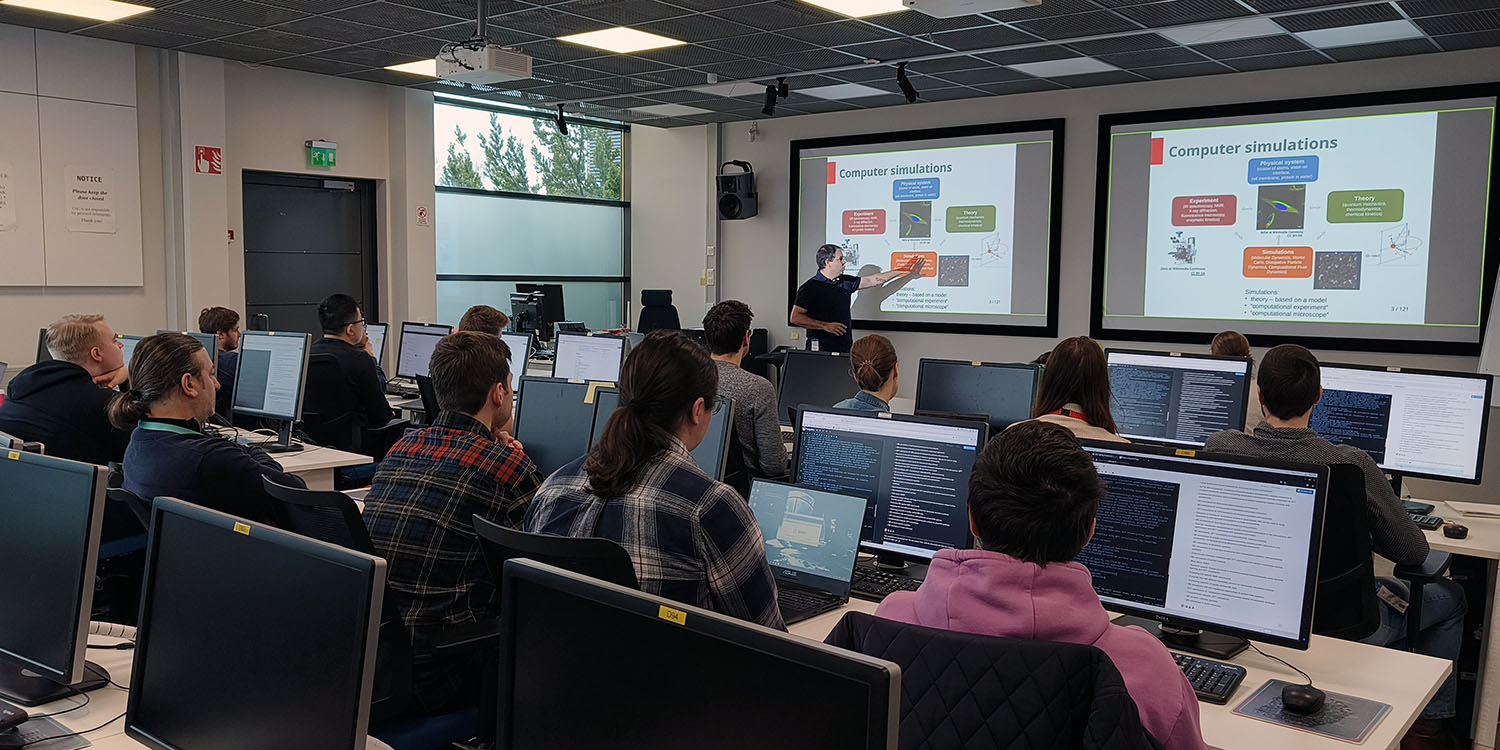Spring School on Computational Chemistry 2024 – Intense three days on fundamentals and community building
Spring School for Computational Chemistry is one of the staple courses organized annually at CSC. The School is an intense three-day training that focuses on molecular modeling and computational chemistry using modern supercomputers. This year the 12th Spring School was organized in slushy Espoo, Finland, on 17-19 April 2024.
The aim of the Spring School is to provide a comprehensive, tutorial-style and hands-on treatment of the essential methods for molecular modeling and computational chemistry using modern supercomputers. It was held exclusively on-site at CSC’s training facilities to help foster discussions through face-to-face interactions and build relationships among the community members.
Comprehensive lectures and hands-on exercises for different levels
The School is aimed at researchers with some skills in one of the three main areas of the School – molecular dynamics, quantum chemistry and machine learning. Researchers who are nearing their Master’s or perhaps already working towards their doctorate are the most likely to benefit from the School. Although basic knowledge of the subject areas of the School is important for the participants, in-depth knowledge is not necessary. “Even though I don’t have a very deep understanding of computational chemistry, I was able to follow the lectures and the exercises were well prepared,” says a participant of the Spring School 2024.
Even though I don’t have a very deep understanding of computational chemistry, I was able to follow the lectures and the exercises were well prepared
Feedback from a course participant
The program of the Spring School has always had the same foundation: day 1 covers classical molecular dynamics (MD) and day 2, electronic structure theory, with both days starting with lectures and followed by hands-on exercises which are offered at three levels of “difficulty”. One of the participants told that the exercises helped them to understand the complex subjects better, “I appreciate the hands-on part of the school, only listening to lectures for the whole day would be uneasy to concentrate on.” Day 3 focuses on clever algorithms: enhanced sampling and machine learning (ML) in chemistry.
I appreciate the hands-on part of the school, only listening to lectures for the whole day would be uneasy to concentrate on.
Feedback from a course participant
Aiming at community interaction
The program aims for engaging discussion among the participants and with the lecturers, on topics covered during the School but also those relevant to participants’ own research projects. The practical approach was appreciated by the participants, as one of them tells in the course feedback, “The Spring School remained very practical without getting stuck in details of history or proving theory.”
The Spring School remained very practical without getting stuck in details of history or proving theory.
Feedback from a course participant
One of the ways to add engagement to the Spring School, was to use a separate “living document” for general information and asking questions asynchronously without disrupting the flow of the talks or exercises. It also helped the lecturers identify areas which needed further clarification and will act as a future reference for participants.
The discussion was enabled by the poster session, the sauna evening and lots of breaks and opportunities for interaction in the training lobby. One of the participants summed up the intensive but rewarding Spring School excellently, “The Spring School was overall very well made. Considering that the topics were something you could spend weeks or months on learning, condensing it into a single day was quite an achievement.”
The Spring School was overall very well made. Considering that the topics were something you could spend weeks or months on learning, condensing it into a single day was quite an achievement.
Feedback from a course participant
Materials from 2024
The materials have been uploaded in Zenodo for anyone to access. If you happen to have access to Puhti or Mahti, you can access the Notebooks directly also later. Alternatively, you can clone the contents to your favourite workstation or supercomputer, in which case you might need to edit some of the Mahti-tailored commands e.g. related to batch queues, but that should be straightforward.
In 2024, the School was organized as a collaboration between CSC, NCC Finland (EuroCC2), BioExcel CoE and researchers from several universities.
Read more
Spring School on Computational Chemistry 2024
- The participants gave the overall rating for the School as 9.13/10 matching the atmosphere.
- The participants would recommend CSC’s training and events to their colleagues very likely based on this event 9.53/10.
Spring School 2025
If you want to participate in the next on-site event, stay tuned for the School registration in late 2024 through CSC and BioExcel channels! We aim to organize the School again in Spring 2025.
